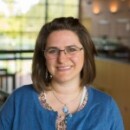Katrina Hay
Professor of Physics
she/her/hers

Phone: 253-535-7999
Email: hay@plu.edu
Office Location: Rieke Science Center - 251
Curriculum Vitae: View my CV
- Professional
- Biography
Education
- Ph.D., Physics, Oregon State University, 2008
- B.S., Physics, Mathematics, Linfield College, 2002
Areas of Emphasis or Expertise
- Fluid Physics
Books
- Little Bear's Big Night Sky (CreateSpace Independent Publishing Platform 2015) : View Book
Selected Presentations
- Geoscience Association, Co-author Research Presentation: “ Capillary Droplets Embedded in a Lubricating Film: Enhancing rock-liquid solute transfer ” Maria Inés Dragila and Katrina M. Hay, Denver, Colorado (October 2013)
- Geoscience Association, Co-author Research Presentation : “ Erosion potential of capillary solitons in fluid transport through the epikarst ” Maria Inés Dragila and Katrina M. Hay, Denver, Colorado (October 2013)
- Symposium on Learning and Teaching, Co-author Scholarly Presentation: Curiosity Questions poster presented (by Dr. Carolina Illie), SUNY Oswego (Fall 2012)
- Northwest Section American Physical Society, Co-author Conference Research Presentation: Research Intern, Matthew Hubbard presented “ How tongue size and roughness affect lapping, Vancouver, B.C., Canada (Fall 2012)
- 2012 National meeting of American Association of Physics Teachers, Scholarly Presentation: “ Pre-Course Student Questions as Motivators for Class Lessons, Philadelphia, PA (August 2012)
Selected Articles
- K. Hay and Z. Wiren. "Do-It-Yourself Low Cost Desktop Lightboard for Engaging Flipped Learning Videos." The Physics Teacher Vol. 57, 2019: 8.
- K. Hay. "Teaching the Physics of Energy while Traveling by Train." The Physics Teacher Vol. 51, February 2013:
- M . Hubbard and K. Hay. "How Tongue Size and Roughness Affect Lapping." Journal of Undergraduate Research in Physics Vol. 16, 2013:
- "560 multiple choice questions with answer-specific feedback (Online Quizzes) (Scholarship of Teaching) requested by editor, for the publisher W. H. Freeman to accompany new textbook." University Physics for Life Science July 2012:
- "Physics of energy as a travel course." (Public Intellectual, article) published in EnergyTeachers.org Community Newsletter. Ithaca, NY February 2012:
- K. Hay and M. Dragila. "Physics of Fluid Spreading on Roughness." Special Issue on Modeling, Analysis and Simulations of Multiscale Nonlinear Systems, Conference proceedings, Oregon State University 2007 Katrina M. Hay, Maria I. Dragila; International Journal of Numerical Analysis and Modeling Vol. 5, 2008:
Accolades
- 2019-2020 Faculty Excellence Award in Advising, PLU
- 2018 "Inspirational Woman" - PLU Center for Gender Equity
- Outstanding Student Paper at conference in Hydrology section for presentation: “Physics of two-phase flow on rough surfaces” at American Geophysical Union Conference 2006, San Francisco
- Certificate of Appreciation for JPL internship and presentation awarded by the Oregon Space Consortium (2005 Annual Affiliate Meeting)
- Teaching Fellowship, Oregon State University 2002-2008
- Sigma Pi Sigma (physics honor society), inducted 2002
Biography
I enjoy explaining physics concepts on a level that is understandable. Depending on a student’s mathematical and scientific background, the language you choose to communicate physics to them is crucial. Physics often has a reputation of being mystical and impossible, but it’s not when it’s broken into its most simple concepts. It’s all around us: driving a car, making music, flying in an airplane, drinking through a straw, riding roller coasters… It can be very satisfying to understand the physical phenomena in the world around you. The value of physics is that it is a way of thinking, not just a piece of knowledge. The most important thing you can take from a physics class is the ability to look at a problem that you have never seen before, break it up into its fundamental concepts and not give up until you have solved it.



Social Media